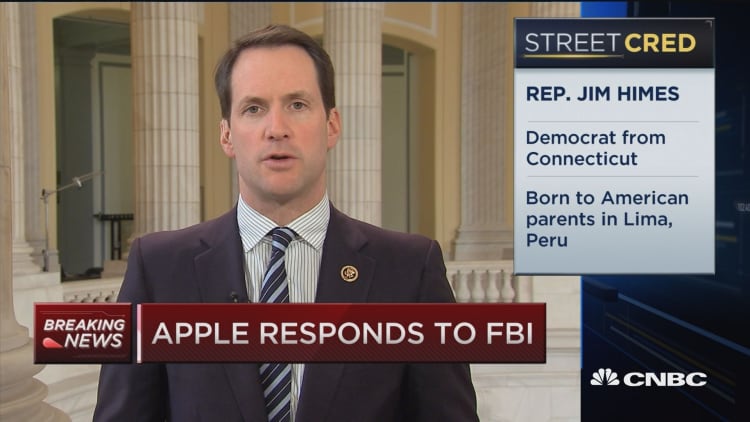
Before Apple creates any software to unlock the iPhone used by one of the San Bernardino, California, shooters, the U.S. government needs to ensure it is adequately protected and will not be abused, a member of the House Intelligence Committee contended Thursday.
Rep. Jim Himes, a Democrat from Connecticut, said he wants to make sure the FBI can retrieve the data only on the iPhone in question and not other devices. He echoed Apple CEO Tim Cook in questioning how much authority the FBI should have to access Apple devices.
"Before we give this authority, we need to answer the question that Tim Cook asked, which is where are the limits of this authority?" Himes said on CNBC's "Closing Bell." "We all want to make ourselves absolutely comfortable that once this code exists that Apple is getting asked to write that it is very well protected."
Apple on Thursday filed a motion to vacate a California judge's order compelling the tech giant to make software that would allow the FBI to crack a phone used by Syed Rizwan Farook, one of the shooters in the 2015 attack that left 14 people dead. Apple and others in Silicon Valley fear the order could lead to compromised user data and wider breaches of privacy.
"No court has ever granted the government power to force companies like Apple to weaken its security systems to facilitate the government's access to private individuals' information," Apple said in a release.
The case has reignited a debate about whether privacy should be sacrificed in order to prevent attacks.
The FBI has maintained that the order would only apply to this particular phone. Speaking before a congressional panel Thursday, FBI Director James Comey said the case is "unlikely to be a trailblazer" for establishing precedent.
Himes argued that the issue should play out in Congress rather than the courts. If Apple does eventually create the software, the government needs to ensure it is not used repeatedly and cannot fall to malicious foreign hackers, Himes argued.
— CNBC's Everett Rosenfeld and Reuters contributed to this report.



